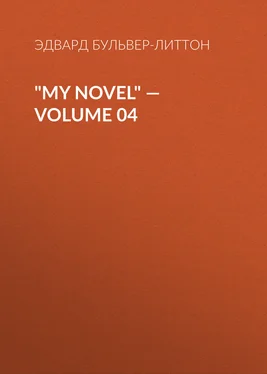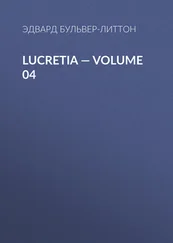Эдвард Бульвер-Литтон - My Novel — Volume 04
Здесь есть возможность читать онлайн «Эдвард Бульвер-Литтон - My Novel — Volume 04» — ознакомительный отрывок электронной книги совершенно бесплатно, а после прочтения отрывка купить полную версию. В некоторых случаях можно слушать аудио, скачать через торрент в формате fb2 и присутствует краткое содержание. Жанр: foreign_prose, literature_19, Европейская старинная литература, foreign_antique, на английском языке. Описание произведения, (предисловие) а так же отзывы посетителей доступны на портале библиотеки ЛибКат.
- Название:My Novel — Volume 04
- Автор:
- Жанр:
- Год:неизвестен
- ISBN:нет данных
- Рейтинг книги:4 / 5. Голосов: 1
-
Избранное:Добавить в избранное
- Отзывы:
-
Ваша оценка:
- 80
- 1
- 2
- 3
- 4
- 5
My Novel — Volume 04: краткое содержание, описание и аннотация
Предлагаем к чтению аннотацию, описание, краткое содержание или предисловие (зависит от того, что написал сам автор книги «My Novel — Volume 04»). Если вы не нашли необходимую информацию о книге — напишите в комментариях, мы постараемся отыскать её.
My Novel — Volume 04 — читать онлайн ознакомительный отрывок
Ниже представлен текст книги, разбитый по страницам. Система сохранения места последней прочитанной страницы, позволяет с удобством читать онлайн бесплатно книгу «My Novel — Volume 04», без необходимости каждый раз заново искать на чём Вы остановились. Поставьте закладку, и сможете в любой момент перейти на страницу, на которой закончили чтение.
Интервал:
Закладка:
Violante took instant compassion upon the victim she had made, and with true feminine caprice now began to scold Jackeymo for his anger, and, finally approaching Leonard, laid her hand on his arm, and said with a kindness at once childlike and queenly, and in the prettiest imaginable mixture of imperfect English and soft Italian, to which I cannot pretend to do justice, and shall therefore translate: "Don't mind him. I dare say it was all my fault, only I did not understand you: are not these things weeds?"
"No, my darling signorina," said Jackeymo in Italian, looking ruefully at the celery-bed, "they are not weeds, and they sell very well at this time of the year. But still, if it amuses you to pluck them up, I should like to see who's to prevent it."
Lenny walked away. He had been called "the scum of the earth,"—by a foreigner too! He had again been ill-treated for doing what he conceived his duty. He was again feeling the distinction between rich and poor, and he now fancied that that distinction involved deadly warfare, for he had read from beginning to end those two damnable tracts which the tinker had presented to him. But in the midst of all the angry disturbance of his mind, he felt the soft touch of the infant's hand, the soothing influence of her conciliating words, and he was half ashamed that he had spoken so roughly to a child.
Still, not trusting himself to speak, he walked away, and sat down at a distance: "I don't see," thought he, "why there should be rich and poor, master and servant." Lenny, be it remembered, had not heard the Parson's Political Sermon.
An hour after, having composed himself, Lenny returned to his work. Jackeymo was no longer in the garden: he had gone to the fields; but Riccabocca was standing by the celerybed, and holding the red silk umbrella over Violante as she sat on the ground, looking up at her father with those eyes already so full of intelligence and love and soul.
"Lenny," said Riccabocca, "my young lady has been telling me that she has been very naughty, and Giacomo very unjust to you. Forgive them both."
Lenny's sullenness melted in an instant: the reminiscences of tracts Nos. 1 and 2,—
"Like the baseless fabric of a vision,
Left not a wreck behind."
He raised eyes swimming with all his native goodness towards the wise man, and dropped them gratefully on the infant peace-maker. Then he turned away his head and fairly wept. The parson was right: "O ye poor, have charity for the rich; O ye rich, respect the poor."
CHAPTER VII
Now from that day the humble Lenny and the regal Violante became great friends. With what pride he taught her to distinguish between celery and weeds,—and how proud too was she when she learned that she was useful! There is not a greater pleasure you can give children, especially female children, than to make them feel they are already of value in the world, and serviceable as well as protected. Weeks and months rolled away, and Lenny still read, not only the books lent him by the doctor, but those he bought of Mr. Sprott. As for the bombs and shells against religion which the tinker carried in his bag, Lenny was not induced to blow himself up with them. He had been reared from his cradle in simple love and reverence for the Divine Father, and the tender Saviour, whose life beyond all records of human goodness, whose death beyond all epics of mortal heroism, no being whose infancy has been taught to supplicate the Merciful and adore the Holy, yea, even though his later life may be entangled amidst the thorns of some desolate pyrrhonism, can ever hear reviled and scoffed without a shock to the conscience and a revolt of the heart. As the deer recoils by instinct from the tiger, as the very look of the scorpion deters you from handling it, though you never saw a scorpion before, so the very first line in some ribald profanity on which the tinker put his black finger made Lenny's blood run cold. Safe, too, was the peasant boy from any temptation in works of a gross and licentious nature, not only because of the happy ignorance of his rural life, but because of a more enduring safeguard,—genius! Genius, that, manly, robust, healthful as it be, is long before it lose its instinctive Dorian modesty; shamefaced, because so susceptible to glory,—genius, that loves indeed to dream, but on the violet bank, not the dunghill. Wherefore, even in the error of the senses, it seeks to escape from the sensual into worlds of fancy, subtle and refined. But apart from the passions, true genius is the most practical of all human gifts. Like the Apollo, whom the Greek worshipped as its type, even Arcady is its exile, not its home. Soon weary of the dalliance of Tempe, it ascends to its mission,—the Archer of the silver bow, the guide of the car of light. Speaking more plainly, genius is the enthusiasm for self-improvement; it ceases or sleeps the moment it desists from seeking some object which it believes of value, and by that object it insensibly connects its self- improvement with the positive advance of the world. At present Lenny's genius had no bias that was not to the Positive and Useful. It took the direction natural to its sphere, and the wants therein,—namely, to the arts which we call mechanical. He wanted to know about steam-engines and Artesian wells; and to know about them it was necessary to know something of mechanics and hydrostatics; so he bought popular elementary works on those mystic sciences, and set all the powers of his mind at work on experiments.
Noble and generous spirits are ye, who, with small care for fame, and little reward from pelf, have opened to the intellects of the poor the portals of wisdom! I honour and revere ye; only do not think ye have done all that is needful. Consider, I pray ye, whether so good a choice from the tinker's bag would have been made by a boy whom religion had not scared from the Pestilent, and genius had not led to the self-improving. And Lenny did not wholly escape from the mephitic portions of the motley elements from which his awakening mind drew its nurture. Think not it was all pure oxygen that the panting lip drew in. No; there were still those inflammatory tracts. Political I do not like to call them, for politics means the art of government, and the tracts I speak of assailed all government which mankind has hitherto recognized. Sad rubbish, perhaps, were such tracts to you, O sound thinker, in your easy-chair! or to you, practised statesman, at your post on the Treasury Bench; to you, calm dignitary of a learned Church; or to you, my lord judge, who may often have sent from your bar to the dire Orcus of Norfolk's Isle the ghosts of men whom that rubbish, falling simultaneously on the bumps of acquisitiveness and combativeness, hath untimely slain! Sad rubbish to you! But seems it such rubbish to the poor man, to whom it promises a paradise on the easy terms of upsetting a world? For, ye see, those "Appeals to Operatives" represent that same world-upsetting as the simplest thing imaginable,—a sort of two-and-two-make-four proposition. The poor have only got to set their strong hands to the axle, and heave- a-boy! and hurrah for the topsy-turvy! Then just to put a little wholesome rage into the heave-a-hoy! it is so facile to accompany the eloquence of "Appeals" with a kind of stir-the-bile-up statistics,— "Abuses of the aristocracy," "Jobs of the Priesthood," "Expenses of the Army kept up for Peers' younger sons," "Wars contracted for the villanous purpose of raising the rents of the landowners,"—all arithmetically dished up, and seasoned with tales of every gentleman who has committed a misdeed, every clergyman who has dishonoured his cloth; as if such instances were fair specimens of average gentlemen and ministers of religion! All this, passionately advanced (and, observe, never answered, for that literature admits no controversialists, and the writer has it all his own way), may be rubbish; but it is out of such rubbish that operatives build barricades for attack, and legislators prisons for defence.
Читать дальшеИнтервал:
Закладка:
Похожие книги на «My Novel — Volume 04»
Представляем Вашему вниманию похожие книги на «My Novel — Volume 04» списком для выбора. Мы отобрали схожую по названию и смыслу литературу в надежде предоставить читателям больше вариантов отыскать новые, интересные, ещё непрочитанные произведения.
Обсуждение, отзывы о книге «My Novel — Volume 04» и просто собственные мнения читателей. Оставьте ваши комментарии, напишите, что Вы думаете о произведении, его смысле или главных героях. Укажите что конкретно понравилось, а что нет, и почему Вы так считаете.












